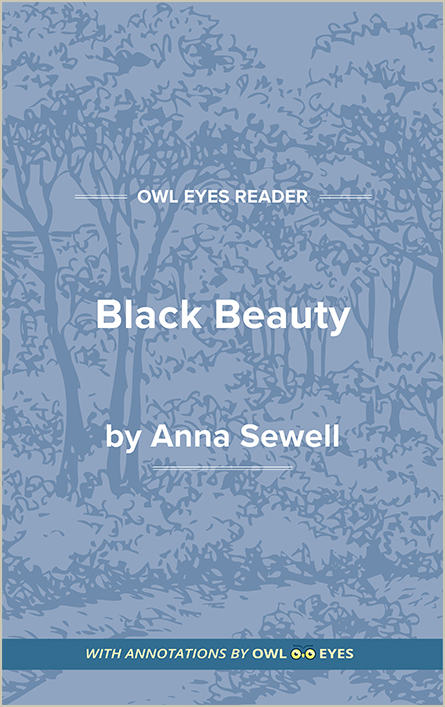Analysis Pages
Plot in Black Beauty
Plot Examples in Black Beauty:
Part I - 02-The Hunt
🔒"church-bell tolling..." See in text (Part I - 02-The Hunt)
Part I - 05-A Fair Start
🔒"bringing back the past..." See in text (Part I - 05-A Fair Start)
Part I - 06-Liberty
🔒"the fidgets..." See in text (Part I - 06-Liberty)
Part I - 07-Ginger
🔒"persecutor..." See in text (Part I - 07-Ginger)
"weaned..." See in text (Part I - 07-Ginger)
Part I - 11-Plain Speaking
🔒"pet scheme..." See in text (Part I - 11-Plain Speaking)
"come down very heavy..." See in text (Part I - 11-Plain Speaking)
Part I - 13-The Devil's Trade Mark
🔒"aggravate..." See in text (Part I - 13-The Devil's Trade Mark)
"scratching..." See in text (Part I - 13-The Devil's Trade Mark)
"thrashing..." See in text (Part I - 13-The Devil's Trade Mark)
Part I - 14-James Howard
🔒"beat the bush on this side..." See in text (Part I - 14-James Howard)
Part I - 17-John Manly's Talk
🔒"it's a pity but what he had been drowned like a puppy or a kitten, before he got his eyes open..." See in text (Part I - 17-John Manly's Talk)
Part I - 19-Only Ignorance
🔒"Bill Starkey..." See in text (Part I - 19-Only Ignorance)
"Martha Mulwash..." See in text (Part I - 19-Only Ignorance)
Part II - 22-Earlshall
🔒"constitution..." See in text (Part II - 22-Earlshall)
Part II - 23-A Strike for Liberty
🔒"stood up better for..." See in text (Part II - 23-A Strike for Liberty)
Part II - 24-The Lady Anne, or a Runaway Horse
🔒"side-saddle..." See in text (Part II - 24-The Lady Anne, or a Runaway Horse)
Part II - 25-Reuben Smith
🔒"bout..." See in text (Part II - 25-Reuben Smith)
Part II - 26-How it Ended
🔒"Union House..." See in text (Part II - 26-How it Ended)
Part II - 28-A Job Horse and His Drivers
🔒"playing the old soldier..." See in text (Part II - 28-A Job Horse and His Drivers)
Part II - 30-A Thief
🔒"blustered..." See in text (Part II - 30-A Thief)
Part II - 31-A Humbug
🔒"thrush..." See in text (Part II - 31-A Humbug)
Part III - 33-A London Cab Horse
🔒"kept up to it but for that day..." See in text (Part III - 33-A London Cab Horse)
Part III - 34-An Old War Horse
🔒"I should think they never saw it..." See in text (Part III - 34-An Old War Horse)
"ruined..." See in text (Part III - 34-An Old War Horse)
"beaten off..." See in text (Part III - 34-An Old War Horse)
"champing of our bits..." See in text (Part III - 34-An Old War Horse)
"caparisoned..." See in text (Part III - 34-An Old War Horse)
Part III - 35-Jerry Barker
🔒"whipcord..." See in text (Part III - 35-Jerry Barker)
"find a curse come with your wealth..." See in text (Part III - 35-Jerry Barker)
"pocketed..." See in text (Part III - 35-Jerry Barker)
"chirrup..." See in text (Part III - 35-Jerry Barker)
"put on the steam..." See in text (Part III - 35-Jerry Barker)
Part III - The Sunday Cab
🔒"alter..." See in text (Part III - The Sunday Cab)
Part III - 39-Seedy Sam
🔒"look to..." See in text (Part III - 39-Seedy Sam)
Part III - 42-The Election
🔒"great bills..." See in text (Part III - 42-The Election)
Part III - 43-A Friend in Need
🔒"mistress..." See in text (Part III - 43-A Friend in Need)
"Inasmuch as ye have done it to one of the least of these..." See in text (Part III - 43-A Friend in Need)
"number..." See in text (Part III - 43-A Friend in Need)
"dodge..." See in text (Part III - 43-A Friend in Need)
Part III - 44-Old Captain and His Successor
🔒"chains..." See in text (Part III - 44-Old Captain and His Successor)
"I thought I should have died..." See in text (Part III - 44-Old Captain and His Successor)
"slave..." See in text (Part III - 44-Old Captain and His Successor)
"treading pretty hard on my toes..." See in text (Part III - 44-Old Captain and His Successor)
Part III - 45-Jerry's New Year
🔒"charge..." See in text (Part III - 45-Jerry's New Year)
Part IV - 46-Jakes and the Lady
🔒"three hundredweight..." See in text (Part IV - 46-Jakes and the Lady)
Part IV - 47-Hard Times
🔒"fetch..." See in text (Part IV - 47-Hard Times)
"hold your tongue..." See in text (Part IV - 47-Hard Times)
Part IV - 48-Farmer Thoroughgood and His Grandson Willie
🔒"genteel..." See in text (Part IV - 48-Farmer Thoroughgood and His Grandson Willie)
"benefactor..." See in text (Part IV - 48-Farmer Thoroughgood and His Grandson Willie)
Part IV - 49-My Last Home
🔒"trial..." See in text (Part IV - 49-My Last Home)

